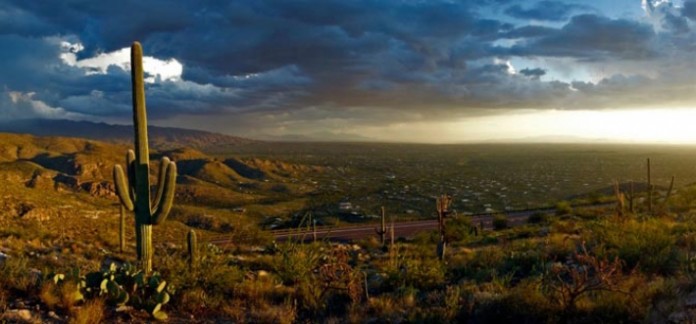Arizonians encouraged to prepare for severe weather hazards
PHOENIX – Governor Doug Ducey has proclaimed June 12 – 17 Monsoon Awareness Week in Arizona in anticipation of the 2016 monsoon and summer severe weather season.
Arizona’s most active weather season is the monsoon, which begins in mid-June and ends in late September. The monsoon is characterized not only by extreme heat like parts of the State experienced last weekend, but also an increase in moisture, which drives the humidity up. These conditions can produce massive thunderstorms, including heavy rain, high winds and lightning, and potentially trigger dust storms, flash floods and wildfires.
Between the extreme heat and threat of flash flooding, summers in Arizona can be dangerous, even life-threatening for uninformed people. Know the signs of dehydration, heat exhaustion and heat stroke. People over 65, children under five, and those with pre-existing medical conditions are at high risk for heat-related illnesses. Reduce exposure to the sun and heat during peak hours.
When it does rain, do not underestimate the power of water. Never drive into a flooded wash or road. It only takes six inches of water to stall your vehicle and 12 inches to float it.
“Monsoon storms can cause serious personal injury and property damage,” said Wendy Smith-Reeve, Arizona Department of Emergency and Military Affairs (DEMA) Deputy Director. “I strongly encourage the Whole Community to take the necessary steps to prepare themselves, their family, and property.”
DEMA has partnered with the National Weather Service; the Arizona departments of Health Services, Homeland Security, Insurance, Public Safety, Transportation and Water Resources; and The Salvation Army to advocate severe weather preparedness. Arizonans are encouraged to take the following actions in preparation for the monsoon:
Plan: Write a communication plan. The plan should identify a family meeting place, evacuation routes away from the house, and an out-of-town contact. Practice the plan with your family.
Prepare: Assemble an emergency supplies kit with enough non-perishable food and potable water to last your family, including pets, for 72 hours. Include a first aid kit, radio, flashlight, batteries, cash, cell phone charger, and copies of important documents.
Inquire: Know what hazards threaten your community. Ask your work and child’s school about their emergency plans. Bookmark www.EIN.az.gov for emergency updates and preparedness information.
Inspire: Be a preparedness example to your community. Give blood, learn first aid, volunteer, and talk to others about what you have learned about preparedness.





